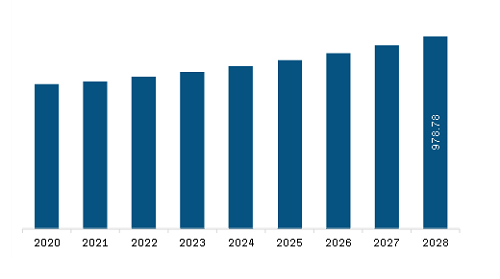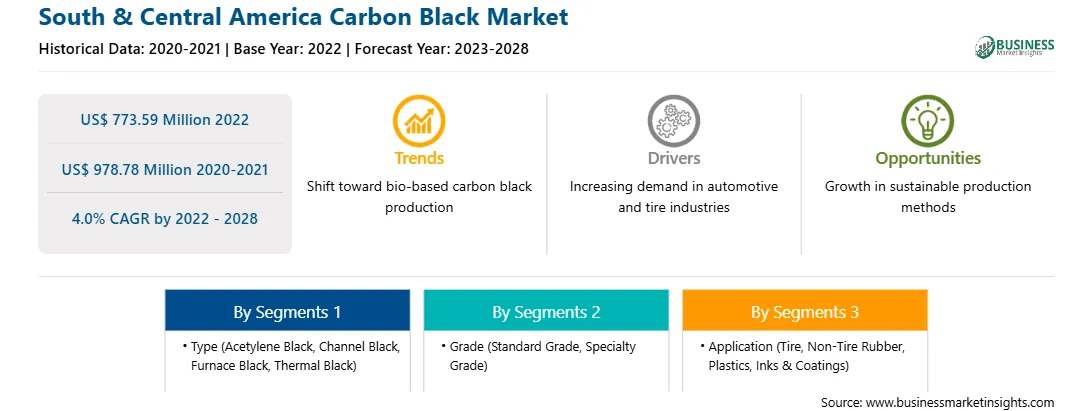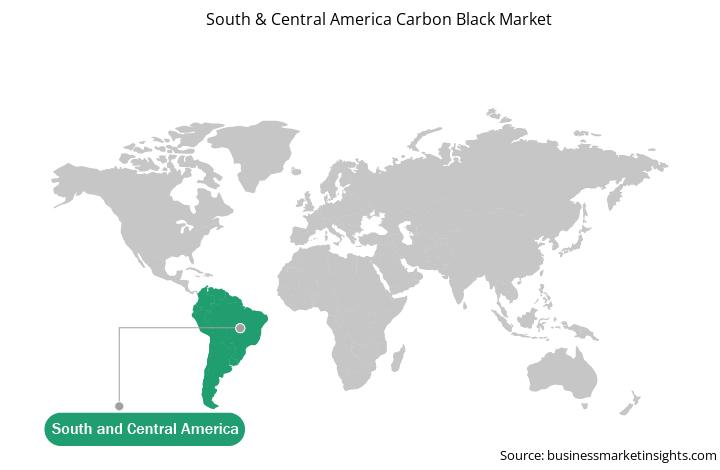The green economy can promote economic development and improve people's lives while promoting environmental and social well-being. An important part of the green economy is promoting sustainable technological developments and adoption. Recovered/green carbon black is emerging as an alternative to virgin carbon black produced from the combustion of crude oil. The carbon black recovered from recycled tires contributes to a significant decrease in CO2 emissions and emphasizes reusing products to minimize waste generation.
Companies are heading toward adopting an eco-friendly and sustainable production approach by investing in better R&D activities to optimize resource consumption. For instance, in February 2021, Michelin, a well-known France-based tire manufacturer, acquired a significant stake in Enviro, a Swedish tire pyrolysis company. Through this collaboration, the company announced that it is planning to build its first tire pyrolysis plant in South America. Enviro has developed a proprietary tire pyrolysis technology that can recover carbon black, oil, steel, and gas from end-of-life tires. Further, in November 2019, as a part of its long-term partnership with DeltaEnergy Group, LLC, Bridgestone Americas Inc. (Bridgestone) announced that it would be using recycled carbon black tires on a large scale in the tire market for the first time. The large-scale commercialization of the patented recovered carbon black product DE Black, recycled by DeltaEnergy Group from end-of-life tires, marks an important milestone in the journey of Bridgestone Group toward its long-term environmental vision of 100% material sustainability and 50% CO2 emission reduction by 2050. Compared to virgin carbon black, DeltaEnergy Group's materials extraction process produces 81% less CO2 per ton. Therefore, a shift toward sustainability and a rise in the need for green alternatives are expected to offer lucrative opportunities for the carbon black market players over the coming years.
The changing economic conditions in South & Central America due to the growth of automotive industries provide significant growth prospects for the carbon black market. The growth in manufacturing industry, and developments by manufacturers in the automotive sector in South & Central America are creating a demand for tires. The tire manufacturing has foreseen a tremendous rise over the past few years in the region. Bridgestone Americas, Inc.; one of the leading tire manufacturing industry players has strong presence in South and Central America through its subsidiaries ‘BATO LA’, which is a part of Bridgestone Americas Tire Operations. BATO LA operates five tire production plants — two in Brazil, and one each in Argentina, Costa Rica, and Venezuela. Furthermore, due to the necessity to meet future energy and emission demands, the popularity of electric vehicles (EVs) has grown in South & Central America over the last few years. The need for environment-friendly transportation is majorly driving the growth of the electric vehicle market in the region. The expansion of automotive industry is expected to boost the demand for automotive components such as tires, batteries, etc. This has led to the rising consumption of carbon black for those applications.
Strategic insights for the South & Central America Carbon Black provides data-driven analysis of the industry landscape, including current trends, key players, and regional nuances. These insights offer actionable recommendations, enabling readers to differentiate themselves from competitors by identifying untapped segments or developing unique value propositions. Leveraging data analytics, these insights help industry players anticipate the market shifts, whether investors, manufacturers, or other stakeholders. A future-oriented perspective is essential, helping stakeholders anticipate market shifts and position themselves for long-term success in this dynamic region. Ultimately, effective strategic insights empower readers to make informed decisions that drive profitability and achieve their business objectives within the market. The geographic scope of the South & Central America Carbon Black refers to the specific areas in which a business operates and competes. Understanding local distinctions, such as diverse consumer preferences (e.g., demand for specific plug types or battery backup durations), varying economic conditions, and regulatory environments, is crucial for tailoring strategies to specific markets. Businesses can expand their reach by identifying underserved areas or adapting their offerings to meet local demands. A clear market focus allows for more effective resource allocation, targeted marketing campaigns, and better positioning against local competitors, ultimately driving growth in those targeted areas.
South & Central America Carbon Black Strategic Insights

South & Central America Carbon Black Report Scope
Report Attribute
Details
Market size in 2022
US$ 773.59 Million
Market Size by 2028
US$ 978.78 Million
Global CAGR (2022 - 2028)
4.0%
Historical Data
2020-2021
Forecast period
2023-2028
Segments Covered
By Type
By Grade
By Application
Regions and Countries Covered
South and Central America
Market leaders and key company profiles
South & Central America Carbon Black Regional Insights

South & Central America Carbon Black Market Segmentation
The South & Central America carbon black market is segmented into type, grade, application, and country.
Based on type, the South & Central America carbon black market is segmented acetylene black, channel black, furnace black, thermal black, and others. The furnace black segment held the largest share of the South & Central America carbon black market in 2022.
Based on grade, the South & Central America carbon black market is segmented into standard grade and specialty grade. The standard grade segment held the largest share of the South & Central America carbon black market in 2022.
Based on application, the South & Central America carbon black market is segmented into tire, non-tire rubber, plastics, inks & coatings, and others. The tire segment held the largest share of the South & Central America carbon black market in 2022.
Based on country, the South & Central America carbon black market is segmented into Brazil, Argentina, and the Rest of South & Central America. Brazil dominated the South & Central America carbon black market in 2022.
Birla Carbon USA Inc; Cabot Corp; Imerys SA; Klean Industries Inc; and Orion Engineered Carbons SA are some of the leading companies operating in the South & Central America carbon black market.
The South & Central America Carbon Black Market is valued at US$ 773.59 Million in 2022, it is projected to reach US$ 978.78 Million by 2028.
As per our report South & Central America Carbon Black Market, the market size is valued at US$ 773.59 Million in 2022, projecting it to reach US$ 978.78 Million by 2028. This translates to a CAGR of approximately 4.0% during the forecast period.
The South & Central America Carbon Black Market report typically cover these key segments-
The historic period, base year, and forecast period can vary slightly depending on the specific market research report. However, for the South & Central America Carbon Black Market report:
The South & Central America Carbon Black Market is populated by several key players, each contributing to its growth and innovation. Some of the major players include:
The South & Central America Carbon Black Market report is valuable for diverse stakeholders, including:
Essentially, anyone involved in or considering involvement in the South & Central America Carbon Black Market value chain can benefit from the information contained in a comprehensive market report.